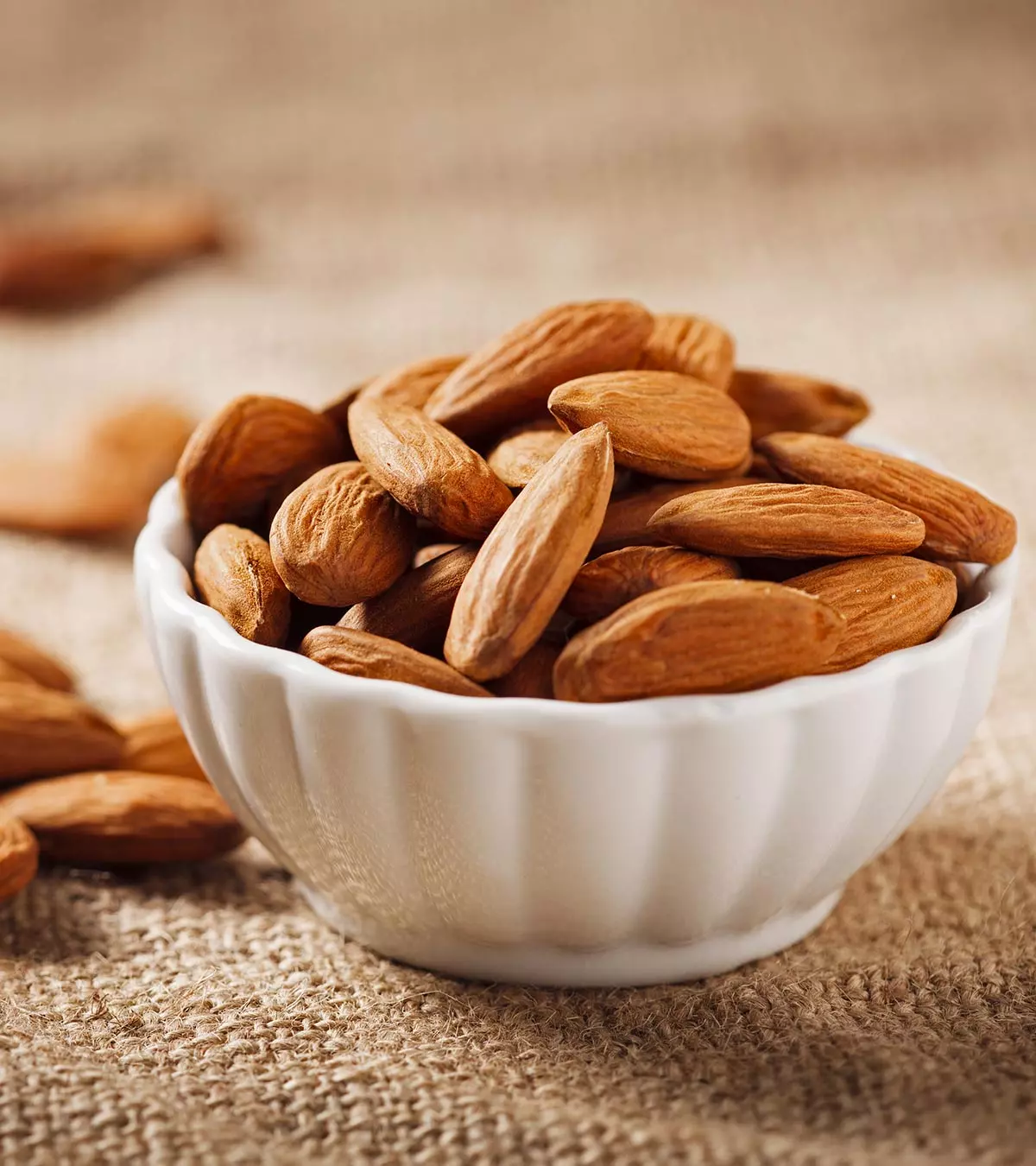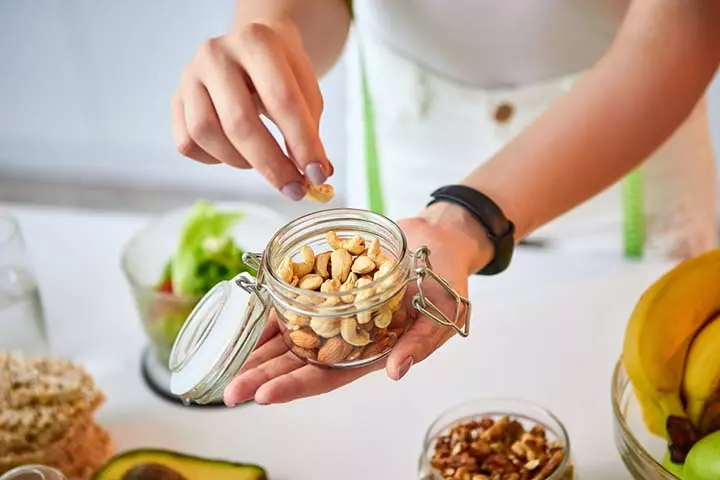
Image: ShutterStock
Almonds are rich in many essential nutrients, including calcium, protein, vitamin, zinc, iron, and magnesium, providing optimum nutrition to the human body. Therefore, you might be thinking about whether or not you can consume almonds while breastfeeding. The delicious nuts make for an excellent snack to munch due to their crunchy texture and tasty flavor. You can eat almonds raw, boiled, soaked in water overnight, roasted, or as an ingredient in different preparations. Keep reading this post to know about the safety and various benefits of eating almonds when nursing a baby.
Key Pointers
- Almonds can be consumed in various forms like soaked, raw, roasted, or boiled in a postnatal diet.
- Almonds provide essential nutrients such as calcium, protein, vitamins, iron, and phosphorus, which are important for a nursing mother.
- Consumption of almonds can aid in breast milk production, weight management, preventing fatigue, improving recovery and immunity, and aiding in baby development.
- Nut allergies can cause respiratory problems, rashes, nausea, and diarrhea, so caution should be taken with almonds.
- Before consuming almonds while breastfeeding, it is essential to consult a doctor to determine safe consumption quantities, precautions, and inclusion methods.
Benefits Of Eating Almonds While Breastfeeding
Eating almonds during breastfeeding can support your health and the growth of your precious baby. Here’s how (1) :
- Nursing mothers should consume nutritious nuts during breastfeeding. You may opt for walnuts and almonds. Gynecologists recommend having almonds in the postpartum period, especially while breastfeeding your baby (2). Raw Almonds are a rich source of healthy plant-based proteins and calcium, which could effectively enhance the growth process of your baby.
 Quick fact
Quick fact
- Almonds are a storehouse of essential nutrients like vitamin E, vitamin B1, B3, and B6. It is also a rich source of minerals like Magnesium, Copper, Phosphorus Iron, Calcium, and Zinc (4) (5). Adding this delicious dry fruit to the maternal diet can help boost the infant’s nutrition and immune system while increasing the mother’s recovery pace (6).
- Almonds are a valuable source of calcium, especially for those who don’t consume dairy. Breastfeeding mothers require adequate calcium (around 1,000mg daily) because breast milk is rich in this mineral. Consuming enough calcium helps protect the mother’s bone and teeth health (7).
- As a nursing mother, it must be difficult for you to take out time and cook special food for yourself to enhance your nutritional intake. Do not worry! Almonds can be a handy, wholesome, and tasty snack that can prevent you from eating junk food and can make post pregnancy weight loss easier for you. Almonds increase satiety, helping you feel fuller for longer. Research suggests that their acute satiating effects may lead to no net increase in daily energy, making them a smart choice for lactating women (8) (9).
 Quick fact
Quick fact- Nuts, especially almonds, are often regarded to serve as galactagoguesiSubstances that promote human milk production (10). By consuming almond or almond milk while breastfeeding, you can effectively improve breast milk quality and quantity (11). Women with lactation problems are often advised to increase their intake of almonds to stimulate their milk production naturally!
- Almonds may improve cholesterol and blood sugar levels, support weight management, and reduce the risk of diabetes, obesity, and heart disease. The heart-healthy fats in almonds may contribute to the nutritional quality of breast milk, while their role in weight management could support postpartum recovery. The blood sugar regulation properties might be helpful for mothers who experienced gestational diabetes and are at higher risk for developing type 2 diabetes (12).
- Inflammation can contribute to discomfort during lactation, including symptoms like breast tenderness and swelling. By including almonds in their diet, nursing mothers might experience less inflammation-related discomfort. Almonds contain anti-inflammatory compounds that can help reduce inflammation. A study found that eating up to 60g (about 2.25oz.) of almonds daily can reduce two different inflammation markers (13).
- As a breastfeeding mother, you must be having a tough time nursing the baby and managing the maternal chores. Almonds are a must-have energy food for you that can help you fight fatigue.
Tiffany Teske, a mother of two, shares about an easy-to-make and nutritious snack that effectively contributed to her post-pregnancy nutritional needs. She says, “My friend, Cindy, brought over a batch of these amazing almond flour scones the week I gave birth to Emmanuelle. They gave me the much-needed energy that was necessary for nursing a newborn and for regaining my strength. Plus, they tasted amazing (i).” These scones were made by combining ground blanched almonds, baking soda, egg (or flax seed emulsion), honey (or maple syrup), chopped organic cooking dates (or raisins), vanilla extract, and ground cardamom. - As you have little time and energy left to take care of your grooming, adding almonds to your meal plans can help you look good effortlessly and win compliments. The Vitamin E in the almonds can give you a glowing skin and lustrous hair and transform you into a yummy mummy (14)!

 Point to consider
Point to considerAlmonds are a healthy snacking alternative for the new moms out there trying to get optimum nourishment during this latest phase in their lives.
When To Stop Eating Almonds While Breastfeeding?
Individuals allergic to nuts should steer clear of almonds, as they may trigger a fatal allergic reaction called AnaphylaxisiAn extreme reaction to an allergen causing breathing difficulties and loss of consciousness (15). Caution is essential during breastfeeding, as you can pass the allergens into breast milk, potentially affecting the baby (16). It is advisable to seek your doctor’s approval before adding almonds to your postnatal diet as it will indirectly affect the health of your baby.
Dr. Ralph Waldo, medical doctor and psychiatry specialist from Carmel, Indiana, says, “While almonds are generally safe, they are a known allergen. Although it is rare for allergens to transfer into breast milk in significant amounts, it’s important to monitor if there is a family history of nut allergies.”
Remember to consume almonds in moderate quantities only. If you are eating almonds, and your newborn is allergic to nuts they may develop the following symptoms (15):
- Wheezing
- Respiratory Trouble
- Nausea
- Diarrhea
- Vomiting
- Itchy skin rashes or hives
- Itchy mouth, throat, skin, eyes, or other areas.
- Trouble swallowing

Seek immediate medical help if you notice the above signs of discomfort in your baby. Your health consultant may advise you to eliminate almonds from your diet while breastfeeding your little one.
Frequently Asked Questions
1. How many almonds should I eat while breastfeeding?
According to the Australian Dietary Guidelines, breastfeeding women are recommended to eat 2½ servings (30g per serving) of unsalted nuts, including almonds, per day 17) (18). Overindulgence may strain liver function and increase the risk of developing kidney stones (19).
2. Do almonds cause gas in breastfed babies?
Yes. Almonds are potentially-allergenic foods, therefore, if your baby is allergic to nuts, such as almonds, eating them while breastfeeding can upset your breastfed baby’s stomach (20).
3. Does eating almonds cause constipation in mothers while breastfeeding?
Consuming almonds while breastfeeding will pass on its effects to the newborn. All the nutrients consumed by the mother can indirectly impact the baby. Therefore, before considering almonds, consult your doctor to ensure their consumption safety. Ensure that you soak them in water for a while before having them. However, if your newborn is allergic to almonds, you may notice respiratory trouble, nausea, and skin issues that indicate you should stop their intake.
Infographic: Advantages Of Eating Almonds During Breastfeeding
Including almonds in your diet while nursing can offer a range of benefits for both the mother and baby. Almonds contain nutrients such as healthy fats, protein, and essential vitamins and minerals. Read the following infographic to learn about the advantages of almonds for lactating mothers.
Some thing wrong with infographic shortcode. please verify shortcode syntaxIllustration: Health Benefits Of Eating Almonds While Breastfeeding

Image: Stable Diffusion/MomJunction Design Team
Personal Experience: Source
MomJunction articles include first-hand experiences to provide you with better insights through real-life narratives. Here are the sources of personal accounts referenced in this article.
i. Almond flour scones – Passing on the pleasure;https://tiffanyteske.blogspot.com/2009/10/almond-flour-scones-passing-on-pleasure.html
References
- 4 Reasons Why Almonds Are Good for You.
https://health.clevelandclinic.org/benefits-of-almonds - 5 best and worst foods for breast milk supply.
https://www.lebonheur.org/blogs/practical-parenting/5-best-and-worst-foods-for-breast-milk-supply - Almonds.
https://nutritionsource.hsph.harvard.edu/food-features/almonds/ - Başak Özdemir et al; (2016); Health Properties Of Almond.
https://keypublishing.org/jhed/wp-content/uploads/2025/07/04.-Full-paper-Ba%C5%9Fak-%C3%96zdemir-Almond.pdf - Nuts, almonds, whole, raw.
https://fdc.nal.usda.gov/food-details/2346393/nutrients - Almonds.
https://nutritionaustralia.org/app/uploads/2025/12/Almonds-The-State-of-the-Science.pdf - Top 10 superfoods for breastfeeding moms.
https://news.sanfordhealth.org/womens/top-10-breastfeeding-superfoods/ - 4 Healthy Snack Ideas for Breastfeeding Moms.
https://neabaptistclinic.org/4-healthy-snack-ideas-breastfeeding-moms/ - Sarah Hull et al; (2014); A mid-morning snack of almonds generates satiety and appropriate adjustment of subsequent food intake in healthy women.
https://pmc.ncbi.nlm.nih.gov/articles/PMC4500840/ - Herbal Support for Lactation: Boosting Milk Supply Naturally.
https://aanmc.org/naturopathic-treatment/herbal-lactation-support/ - National Breastfeeding Month.
https://weillcornell.org/news/national-breastfeeding-month - Davide Barreca et al; (2025); Almonds (Prunus Dulcis Mill. D. A. Webb): A Source of Nutrients and Health-Promoting Compounds.
https://pdfs.semanticscholar.org/bcc8/bba9604082a3f355cd1bf8201d876e23bfc6.pdf - Shahin Fatahi et al; (2025); The Effects of Almond Consumption on Inflammatory Biomarkers in Adults: A Systematic Review and Meta-Analysis of Randomized Clinical Trials.
https://pubmed.ncbi.nlm.nih.gov/34967837/ - Vitamins for Healthy Skin: Things to Know.
https://florida-academy.edu/vitamin-for-skin/ - Tree Nut.
https://acaai.org/allergies/allergic-conditions/food/tree-nut/ - Breast Milk and Your Diet: What Nursing Parents Need to Know.
https://www.healthychildren.org/English/ages-stages/baby/breastfeeding/Pages/Breastmilk-And-Your-Diet.aspx - Australian Dietary Guidelines.
https://www.eatforhealth.gov.au/sites/default/files/2025-09/n55a_australian_dietary_guidelines_summary_131014_1.pdf - Nuts and seeds.
https://www.betterhealth.vic.gov.au/health/healthyliving/nuts-and-seeds#nuts-seeds-and-weight-management - Can You Overdose on Nuts?
https://www.uhhospitals.org/blog/articles/2025/01/can-you-overdose-on-nuts - Peanut and tree nut allergy.
https://www.rch.org.au/kidsinfo/fact_sheets/Peanut_and_tree_nut_allergy/ - Constipation.
https://www.ucsfhealth.org/education/constipation
Community Experiences
Join the conversation and become a part of our nurturing community! Share your stories, experiences, and insights to connect with fellow parents.
Read full bio of Dr. Jessica Madden
- Dr. Ralph Waldo is board-certified in Psychiatry and Neurology. He owns a private practice in Carmel, Indiana, practicing integrative, biochemical, genetic, and functional medicine. Dr. Waldo graduated from Indiana University with degrees in biology and psychology, following which he received an MS in Physiology and Biophysics. Serving as chief resident during his final year of residency, Dr. Waldo completed his training in Psychiatry at the University of Cincinnati.
 Dr. Ralph Waldo is board-certified in Psychiatry and Neurology. He owns a private practice in Carmel, Indiana, practicing integrative, biochemical, genetic, and functional medicine. Dr. Waldo graduated from Indiana University with degrees in biology and psychology, following which he received an MS in Physiology and Biophysics. Serving as chief resident during his final year of residency, Dr. Waldo completed his training in Psychiatry at the University of Cincinnati.
Dr. Ralph Waldo is board-certified in Psychiatry and Neurology. He owns a private practice in Carmel, Indiana, practicing integrative, biochemical, genetic, and functional medicine. Dr. Waldo graduated from Indiana University with degrees in biology and psychology, following which he received an MS in Physiology and Biophysics. Serving as chief resident during his final year of residency, Dr. Waldo completed his training in Psychiatry at the University of Cincinnati.
Read full bio of Jessica Albert
Read full bio of Swati Patwal
Read full bio of Shinta Liz Sunny


















